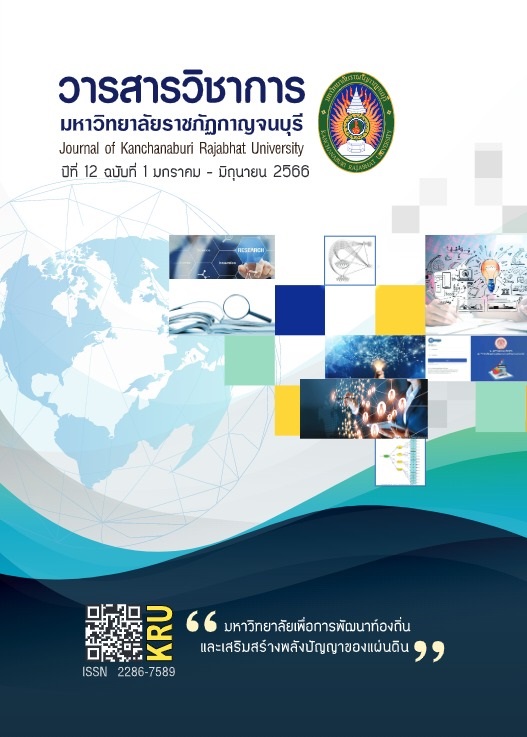TEACHING AND LEARNING WITH SOCIAL MEDIA CASE STUDIES WITH DIGITAL STORYTELLING TO PROMOTE ROBOT CONTROL PROGRAMMING ABILITY FOR VOCATIONAL CERTIFICATE STUDENTS. นักศึกษาหลักสูตรครุศตรมหาบัณฑิต สาขาคอมพิวเตอร์ศึกษา
Main Article Content
Abstract
Due to the current covid-19 pandemic, it has had an educational impact, with this research aimed at the following: 1) To improve and find the quality of the teaching plan with social media case studies through digital storytelling. To promote the ability to write robot drivers. For students with a professional diploma 2) to develop teaching materials with social media case studies with digital storytelling 3) To find the effectiveness of teaching and learning with social media case studies with developed digital storytelling 4) To compare academic achievement before and after classes with teaching and learning. Social media case study with digital storytelling 5) To study the ability to write robot drivers for students with professional certificates 6) To study learners' satisfaction with social media case studies with digital storytelling. The target group used in the trial was 40 students with a professional diploma at Nakhon Pathom Polytechnic College in semester 2 of the 2021 academic year by simple random sampling method the tools in this research are 1) learning management plan, 2) 30 pre- and post-study tests, 3) digital media, 4) programming quality assessments, statistics used in data analysis, including arithmetic mean, standard deviation, and t-test statistics.
The results of the research showed that
1) Plan to teach with case studies through social media with digital storytelling To promote the ability to write robot drivers. For students with a professional diploma, the quality is very good.
2) Media and quality of teaching with case studies through social media with digital storytelling To promote the ability to write robot drivers. For students with a professional diploma in the field of quality assessment in presentation media, the quality is very good.
3) The effectiveness of teaching and learning with case studies through social media with narrative Digital matters to promote the ability to write robot drivers for students, the E1/E2 professional certificate is 84.33/82.00, effective according to the criteria 80/80.
4) Post-study achievement, which is statistically significantly higher than before class at 0.05.
5) The programming ability of the learner after studying, overall with an average of 4.17, was good.
6) The student's satisfaction with teaching and learning is very high. The results of the student satisfaction assessment are the most satisfied.
Article Details

This work is licensed under a Creative Commons Attribution-NonCommercial-NoDerivatives 4.0 International License.
References
กนิษฐา ศรีอเนก. (2555). รายงานการวิจัยเรื่องการจัดการเรียนการสอนโดยใช้กรณีศึกษากับการเรียนรายวิชา
ระบบสารสนเทศเพื่อการจัดการทางธุรกิจ. กรุงเทพฯ : มหาวิทยาลัยราชภัฏสวนดุสิต.
กัมพล ทองเรือง. (2554). การพัฒนารูปแบบบทเรียนออนไลน์โดยใช้วิธี 4MAT. วารสารวิจัย มสด สาขามนุษยศาสตร์และสังคมศาสตร์, 7(1), 89 – 96.
กิตติศักดิ์ อังคะนาวิน. (2561). การพัฒนาชุดทดลองและการหาประสิทธิภาพของการประยุกต์ใช้บอร์ดไมโครคอนโทรลเลอร์
ในการควบคุมหุ่นยนต์ วิชาไมโครคอนโทรลเลอร์และอินเตอร์เฟส. วารสารนวัตกรรมการศึกษาและการวิจัย, 2(2), 117 – 128.
ชินภัทร ภูมิรัตน์. (2552). การจัดการความรู้ทางการศึกษา. กรุงเทพฯ: คณะกรรมการการศึกษาแห่งชาติ.
ทิศนา แขมมณี. (2551). ศาสตร์การสอนองค์ความรู้เพื่อการจัดกระบวนการเรียนรู้ที่มีประสิทธิภาพ. (พิมพ์ครั้งที่ 7). กรุงเทพฯ: จุฬาลงกรณ์มหาวิทยาลัย.
เนาวนิตย์ สงคราม. (2554). การสร้าง Digital Video & Digital Storytelling เพื่อการเรียนการสอนยุคดิจิทัล. กรุงเทพฯ: จุฬาลงกรณ์มหาวิทยาลัย.
พงษ์ศักดิ์ บุญพักดี. (2563). การประเมินการจัดการเรียนการสอนแบบออนไลน์บนฐานวิถีชีวิตใหม่ สำหรับนักศึกษา
วิทยาลัยเทคนิคสุโขทัย. T - VET Journal สถาบันการอาชีวศึกษาภาคเหนือ, 3(1), 39 – 54.
พินิติ รตะนานุกูล. (2558). นโยบายการผลิตและพัฒนาครู. วารสารการศึกษาไทย, 12(120), 7-10.
ภัทรา ยางเดี่ยว. (2553). การสร้างบทเรียนผ่านเครือข่ายคอมพิวเตอร์ที่เรียนโดยกระบวนการกรณีศึกษาในวิชาการถ่ายภาพสำหรับบัณฑิตศึกษา. ” วิทยานิพนธ์ปริญญาครุศาสตร์อุตสาหกรรมมหาบัณฑิตสาขาวิชาครุศาสตร์เทคโนโลยี คณะครุศาสตร์อุตสาหกรรมและเทคโนโลยี มหาวิทยาลัยเทคโนโลยีพระจอมเกล้าธนบุรี.
ภานุพงค์ แสงฤทธิ์. (2558). การพัฒนาบทเรียนบนเว็บ ที่ส่งเสริมความสามารถในการคิดแก้ปัญหา สำหรับการเขียนโปรแกรมคอมพิวเตอร์ ด้วยโปรแกรมจำลองเหตุการณ์หุ่นยนต์ วารสารมนุษยศาสตร์ และสังคมศาสตร์ มหาวิทยาลัยราชภัฏอุดรธานี, 10(2), 118.
มนต์ชัย เทียนทอง. (2548). การออกแบบและพัฒนาคอร์สแวร์สำหรับบทเรียนคอมพิวเตอร์. (พิมพ์ครั้งที่ 2). กรุงเทพฯ: สถาบันเทคโนโลยีพระจอมเกล้าพระนครเหนือ.
ศรีศักดิ์ จามรมาน. (2554). การใช้เฟซบุ๊กเป็นศูนย์แห่งการเรียนรู้ในสถานศึกษา. ค้นเมื่อ มกราคม 12, 2565,
จาก http://www.dmaonline.in.th/indexphp?modules=article&f=view&cat_id=3&id=58.
ศิริโสภา แสนบุญเวช. (2562). การพัฒนาการสอนโดยการเล่าเรื่องผ่านสื่อดิจิทัลเพื่อพัฒนาการออกเสียงภาษาอังกฤษและความคิดสร้างสรรค์ของนักเรียนระดับปริญญาตรี. วิทยานิพนธ์การศึกษาตามหลักสูตรศึกษาศาสตรดุษฎีบัณฑิต สาขาวิชาหลักสูตรและการสอน วิทยาลัยครุศาสตร์ มหาวิทยาลัยธุรกิจบัณฑิตย์.
สำนักงานคณะกรรมการการศึกษาแห่งชาติ สำนักนายกรัฐมนตรี. (2542). พระราชบัญญัติการศึกษาแห่งชาติ, คุรุสภาลาดพร้าว, กรุงเทพฯ, หน้า 26.
สำนักงานคณะกรรมการการอาชีวศึกษา. (2562). หลักสูตรประกาศนียบัตรวิชาชีพ, หน้า 11.
สำนักงานพัฒนาธุรกรรมทางอิเล็กทรอนิกส์ (องค์การมหาชน). (2559). พฤติกรรมผู้ใช้อินเทอร์เน็ตในประเทศไทย
ปี 2559. ค้นเมื่อ ธันวาคม 13, 2565, จาก https://www.etda.or.th/content/thailand-internet-user-profile-2016-conference.html.
สุคนธ์ สินธพานนท์ และคนอื่นๆ. (2554). วิธีสอนตามแนวปฏิรูปการศึกษา เพื่อพัฒนาคุณภาพของเยาวชน. กรุงเทพฯ: 9199 เทคนิคพริ้นติ้งนิทาน.
Julian, M.,Kinzie, MB., Larsen., (2000). V.A. Compelling case experiences: Performance, practice and application for emerging instructional designers, Performance Improvement Quarterly, 38-54.


